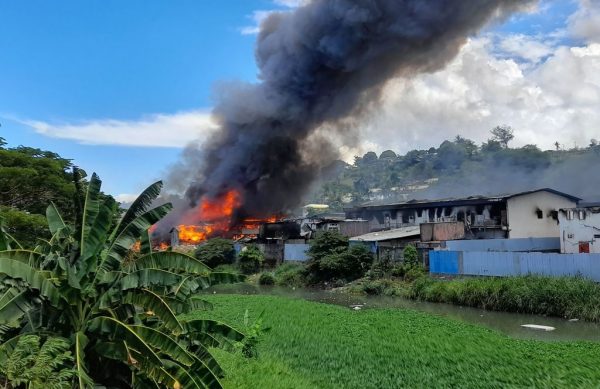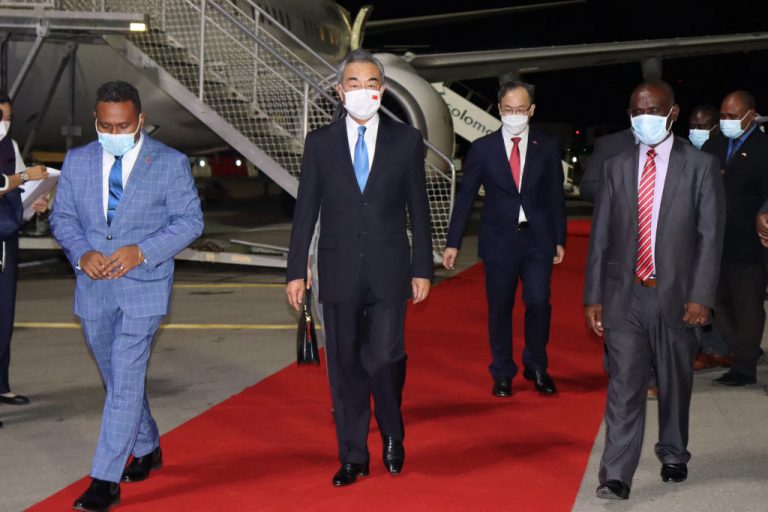People’s Republic of China (PRC) Foreign Minister Wang Yi and a 20-strong delegation arrived in the Solomon Islands on Thursday, May 26, kicking off an eight-country tour that comes in the heels of a confirmed security pact between the two countries.
The Chinese government claims the purpose of the trip is to “build on a long history of friendly relations between Beijing and the island nations,” while neighboring countries such as Australia and New Zealand were quick to react by sending their own foreign ministers to meet the PRC delegation and find out what deals Beijing could be signing with other countries in the region.
- Japan Joins Australia and New Zealand in Protest Over China-Solomon Islands’ Security Pact
- Solomon Islands Under Western Pressure to Scrap Security Deal With China
- Following Confirmed Security Deal, Leaked File Reveals China Intended to Build Naval Base in the Solomon Islands
China’s ambitions in the Pacific first attracted renewed attention back in March, when a draft of the security agreement was leaked online and showed that Beijing could send troops to the island nation at any time and even establish a permanent military base there.
Both Solomon Islands’ Prime Minister Manasseh Sogavare and the Chinese Foreign Ministry have denied any expansive military plans, calling the concerns “groundless and ill-intentioned.”
The Pacific Island nation of fewer than 1 million people is located 1,240 miles northeast of Australia and switched diplomatic recognition from the Taiwan — officially the Republic of China — to Beijing in 2019.
Australia, New Zealand and U.S. on high alert
Success
You are now signed up for our newsletter
Success
Check your email to complete sign up
Following news of Wang’s visit to the region, Australia sent its own Foreign Minister Penny Wong to Fiji to shore up support and find out what Beijing’s military and financial ambitions are.
In Fiji, Wong said it was up to each island nation to decide what partnerships they formed and what agreements they signed, but urged them to consider the benefits of sticking with Australia.
“Australia will be a partner that doesn’t come with strings attached nor imposing unsustainable financial burdens,” Wong said. “We are a partner that won’t erode Pacific priorities or Pacific institutions.
The U.S. sent a high-level delegation to the Solomons earlier this month to express Washington’s concerns about the Chinese security deal, with ambassador Daniel Kritenbrink, assistant secretary of state for east Asian and Pacific affairs, refusing to rule out military action should China establish a military base on the island.

New Zealand has decided on a softer approach, with Prime Minister Jacinda Ardern this week saying it was “not for us to speak on behalf of other Pacific nations,” but that her government stood “ready to respond” to security needs in the region should any conflicts arise.
“When you consider the extent of China’s global interests and the relatively small size of the Pacific countries, that tells you immediately that Beijing has ambitious long-term plans in the region,” Richard McGregor, a senior fellow at Australia’s Lowy Institute told The Guardian.
Beijing seeks sweeping expansion deal in region
In another move by China, a draft document obtained by several media outlets showed that Wang is hoping to strike a comprehensive economic security deal with 10 small Pacific nations during his visit. The sweeping agreement would cover everything from security to fisheries and is part of a pre-written agreement that Wang will introduce in a meeting scheduled for May 30 in Fiji.
Reuters reported that Teburoro Tito, Kiribati’s ambassador to the U.S. and the U.N., told reporters this week that China had agreed in principle to “finance the refurbishment of a world war two runway on Kanton island,” but denied reports that a broader security deal was in the works.
Concerns have been mounting that Kiribati could sign a deal with China, giving it special fishing rights in the Phoenix Islands Protected Area (PIPA), which was one of the world’s largest marine protected areas until the Kiribati government announced last year that it would allow the PIPA to be utilized for commercial fishing and be open to the public.
In addition to the first bilateral security deal between Beijing and Honiara, it is widely expected that Wang will sign further agreements with Solomons’ PM Sogavare during his time on the island. Wang is also planning to make stops in Kiribati, Samoa, Fiji, Tonga, Vanuatu, Papua New Guinea and East Timor during his 10-day visit.














